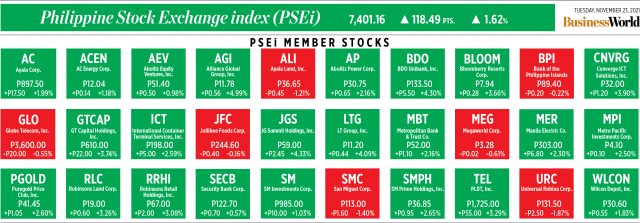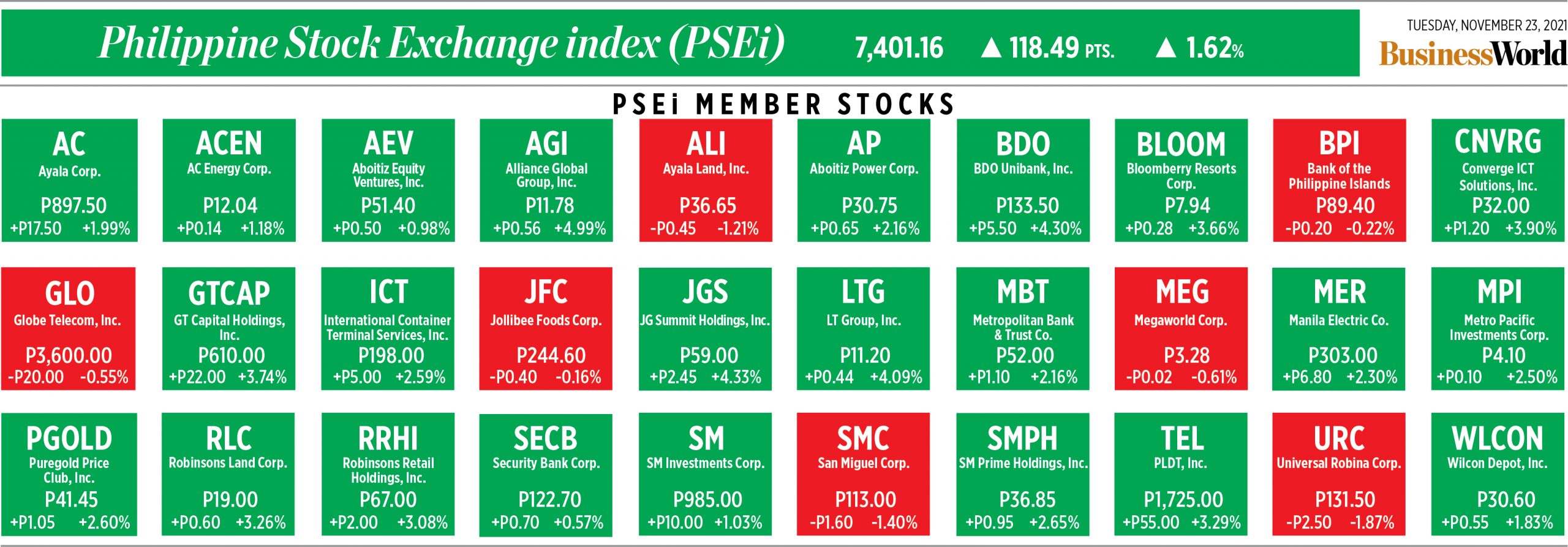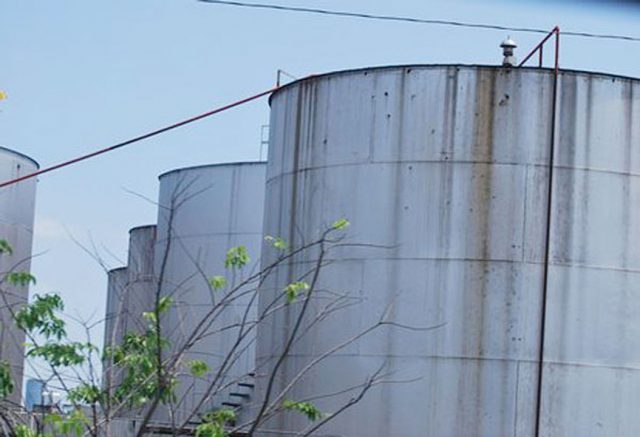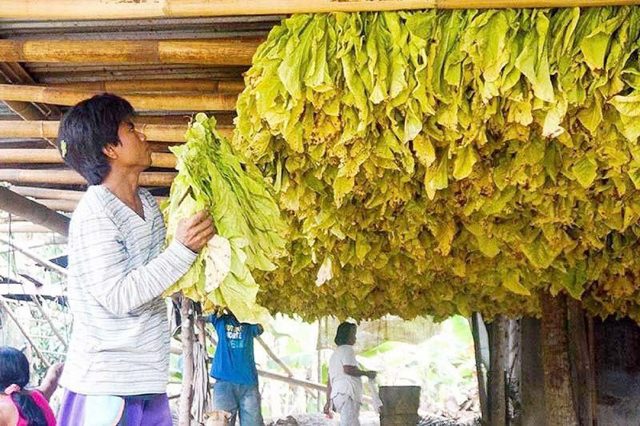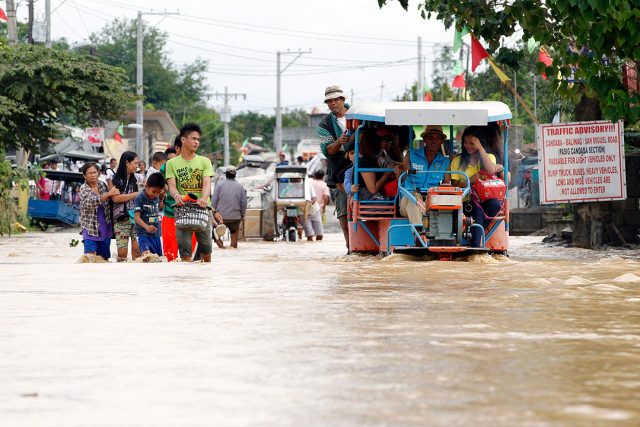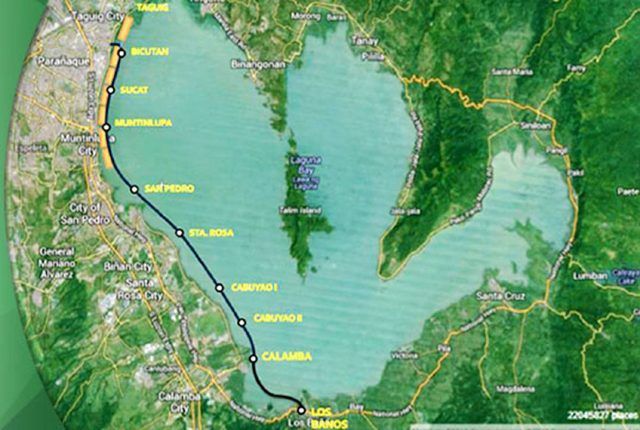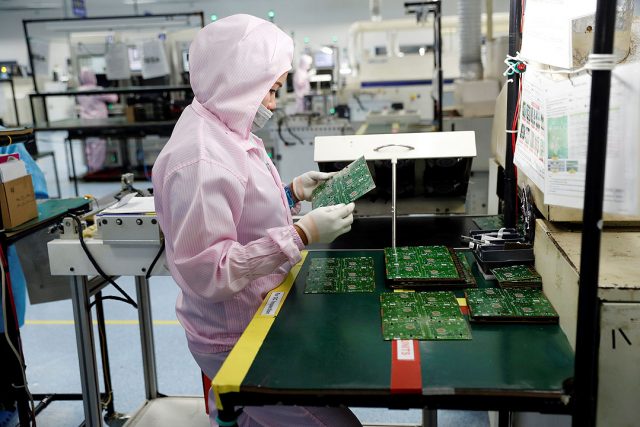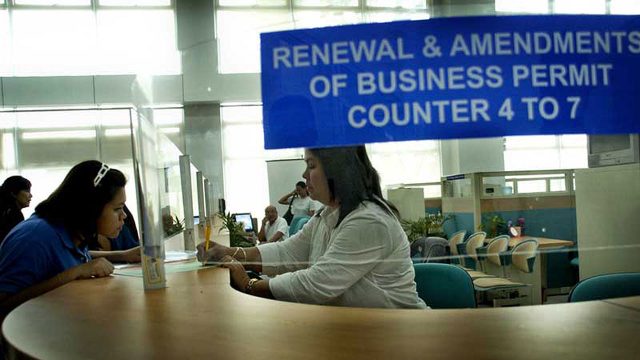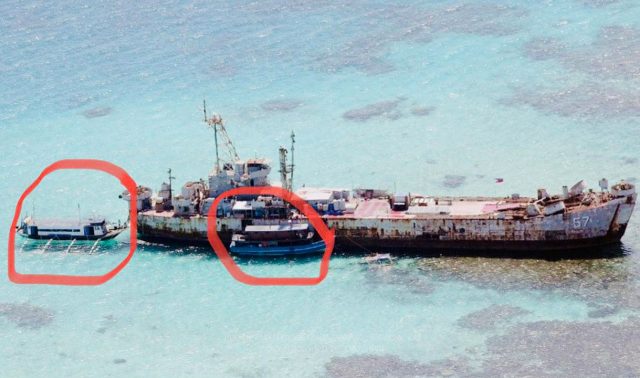Farmers dispute gov’t claims of falling rice prices
A FARMERS’ association said the government’s assertion that rice prices have fallen since imports were liberalized would not hold true if current prices were compared to prices in 2017.
Federation of Free Farmers National Manager Raul Q. Montemayor said in a statement: “The Department of Agriculture is hiding the fact that rice prices after the RTL (Rice Tariffication Law) enactment were actually the same or slightly higher than prices in 2017, which was a more normal year. Official data from the Philippine Statistics Authority (PSA) show that RTL has actually been a flop in terms of lowering rice prices, particularly for poor consumers.”
Agriculture Secretary William D. Dar has said that the price of well-milled rice dropped by P7 to P38 per kilogram (/kg) from P45/kg recorded in 2018, citing the effects of the RTL and the Rice Competitiveness Enhancement Fund (RCEF), a component of the law which is funded from rice tariffs.
Republic Act No. 11203 or the Rice Tariffication Law took effect in March 2019. It allowed the private sector to import rice more freely, with their shipments subject to a tariff of 35% on Southeast Asian grain. Such tariffs provide the RCEF with P10 billion a year to support projects to improve farming efficiency.
“By the end of the six-year implementation of the law, we shall be near the P8/kg production cost target,” Mr. Dar said.
Mr. Montemayor countered: “The P38/kg price is actually for cheaper regular milled rice. PSA data show that the average price for well-milled rice from 2019 to September 2021 was actually P42.26/kg, or just P2.74/kg below the P45 level in 2018.”
Mr. Montemayor called the DA’s data on the cost of production “misleading.”
“PSA data show that average cost of palay production was actually lower at P11.05/kg in 2016-2017. This went up to P11.45/kg when Mr. Dar took over the DA in 2019, and further deteriorated to P11.52/kg in 2020, despite the billions poured into RCEF programs,” Mr. Montemayor said.
“While palay (unmilled rice) output reportedly grew by almost 7% in the third quarter of the year, the increase was exclusively due to the expansion of harvested area. Average yields in fact declined to 4.11 metric tons (MT) per hectare in the third quarter compared to 4.13 MT during the same period in 2020, putting into question the effectiveness of the DA’s strategy of raising yields by giving free certified seeds to farmers,” he added.
The DA has a production target of 20.4 million MT of palay in 2021, against the 19.4 million MT logged in 2020. — Revin Mikhael D. Ochave
Bill proposes 30-day minimum fuel inventory rule
A BILL has been filed at the House of Representatives that would require fuel companies to maintain a minimum inventory of 30 days’ estimated consumption and to disclose in detail their costs after imported fuel is landed.
Pampanga Rep. Juan Miguel M. Arroyo, chairman of the House Committee on Energy, said House Bill 10505 is intended to ensure energy security and price transparency. The measure proposes to amend the oil industry deregulation law.
The amendments had been requested by the Department of Energy (DoE) in a letter to Congress on Oct. 19. The DoE said such a measure would “ensure a level playing field” within the oil industry while protecting consumers.
The 30-day inventory requirement applies to refiners, importers, and bulk distributors on a per company, per depot, and per product basis.
A Minimum Inventory Requirement compliance report is to be filed with the Department of Energy (DoE) weekly.
The measure will also require the detailed disclosure of fuel companies’ costs after the fuel is imported, including port charges, refining costs, and marketing costs. The price of crude, foreign exchange losses or gains, and freight, remain unregulated.
The fuel industry is also required to submit an annual downstream oil industry development plan to the DoE which includes business plans, management models in the conduct of business, and other items as may be required by the DoE.
In case of a determination of “unreasonable” petroleum product prices, a task force will be formed by the Oil Industry Management Bureau and the DoE’s Legal Services office to investigate, with action expected within 30 days.
The bill will prescribe penalties for violating the oil deregulation law such as fines of P50,000 to P300,000, along with a suspension or revocation of registration from the DoE or other government agencies.
They may also be liable for imprisonment of three months to one year.
The House Committee on Ways and Means approved a bill on Nov. 11 to suspend or lower the excise tax on some fuel products for six months.
The measure is now awaiting second reading at the plenary.
On Tuesday, oil companies rolled back the price of gasoline by P0.85 per liter while diesel and kerosene prices fell by P1.20 and P1.30 respectively.
As of Nov. 16, year-to-date pump prices for gasoline and diesel have increased by P20.05/L and P17.50/L, respectively, according to the DoE. — Russell Louis C. Ku
LGU allocation from tobacco tax is P24.8B
The Department of Budget and Management (DBM) said local government units (LGUs) have been allocated P24.8 billion as their share from excise taxes collected from tobacco in 2019.
The department in its budget memorandum orders released Tuesday said that LGUs will get over P19.87 billion from excise taxes on domestically-manufactured Virginia-type cigarettes, as well as P4.94 billion from taxes on Burley and native tobacco.
Excise tax allocations from Virginia-type cigarettes must be used to support tobacco farmers, including cooperative projects to improve farmer productivity, livelihood projects like alternative farming systems, and infrastructure projects like farm-to-market roads.
The Burley and native tobacco allocations go towards funding inputs for other agricultural products like spices and rice, financial support for displaced tobacco farmers, cooperative programs for farmers planting other crops, and infrastructure projects, among others.
LGU receipts from 2018 excise tax collections hit P21.28 billion, including P17.33 billion from taxed Virginia-type cigarettes.
Shares are distributed among provinces according to their volume of tobacco production.
Republic Act No. 7171 directs the DBM to allot a percentage of taxes on domestically- manufactured Virginia-type cigarettes to local governments.
Republic Act No. 10351 or the Sin Tax Law of 2012 assigns a percentage of the tobacco excise tax to fund programs supporting tobacco farmers. — Jenina P. Ibañez
PHL tells ASEAN it views climate change as ‘existential threat’
Finance Secretary Carlos G. Dominguez III is urging Southeast Asian countries to speed up their climate change adaptation and mitigation projects, noting that the Philippines views the matter with a “great sense of urgency” because it represents “an existential threat.”
Mr. Dominguez, who is also chairman-designate of the Climate Change Commission, said members of the Association of Southeast Asian Nations (ASEAN) must “vigorously escalate” climate change initiatives because the region is vulnerable to the consequences of global warming.
“We are most open to sharing expertise, best practices, and technologies with the rest of the region. We hope our initiatives could be replicated and scaled by other countries,” he said at the Third Climate Smart and Disaster-Resilient ASEAN forum Tuesday.
“The Philippines will do all these with a great sense of urgency. We see global warming as an existential threat to our archipelago.”
Extreme weather events have caused P506.1 billion in losses and damage to the Philippines over the past decade. The Department of Finance (DoF) has said that this highlights the Philippines’ vulnerability to the climate crisis even though it accounts for only 0.3% of the world’s total greenhouse gas emissions.
Mr. Dominguez said the initiatives being pursued by the Philippines include the Sustainable Finance Roadmap, designed to harness public and private investment to support the transition to a clean, sustainable and climate-resilient economy.
He is also asking multilateral banks to come up with guidelines for vetting climate adaptation projects in developing countries to firm up the projects’ attractiveness to private investors.
The ISEAS–Yusof Ishak Institute Southeast Asia Climate Outlook 2021 survey report found that the top climate impact concerns in the region are floods, loss of biodiversity, and rising sea levels.
Nearly 85% of survey respondents said businesses should bear the costs of climate change measures, while 79% said governments should do so. Less than half believe that multilateral organizations or private individuals should also be responsible for funding. — Jenina P. Ibañez
Lakeshore road design seen completed by 2023
The Department of Public Works and Highways (DPWH) said Tuesday that the detailed engineering design process for the Laguna Lakeshore Road Network Project Phase 1 will start next month and is expected to be completed after President Rodrigo R. Duterte steps down from office.
The detailed engineering design will be carried out over 15 months until February 2023.
The beginning of the design process is “another significant development in one of the department’s flagship infrastructure projects,” Public Works Undersecretary Emil K. Sadain said in a statement.
The project is a road network on the western shore of Laguna de Bay connecting Lower Bicutan, Taguig City and Calamba City, Laguna. The main alignment runs for 37.60 kilometers.
The new road network is expected to provide a faster alternative to motorists traveling south or north. It is also expected to boost the economies of Laguna, Rizal, Quezon and Batangas.
The project will have interchanges in Sucat, Alabang, Tunasan, San Pedro/Biñan, Santa Rosa, Cabuyao, and Calamba.
The P135.485-million contract for the detailed engineering design was signed on Nov. 22, the DPWH said.
The department said the parties to the contract are Jovito Santos of Lead Consultant CTI Engineering International Co., Ltd.; Junichiro Minobe of Chodai Co., Ltd.; Takashi Sato of Oriental Consultants Global Co., Ltd.; and Tenkoh Yoshida of Nippon Engineering Consultants Co., Ltd. — Arjay L. Balinbin
Crisis viewed as PHL’s chance to snag investment
THE pandemic offers an opportunity for the Philippines to attract foreign investment in manufacturing in order to rebalance the economy away from its traditional reliance on consumption, Stratbase ADR Institute President Victor Andres C. Manhit said.
“While Philippine economic growth has been traditionally mostly consumption-led, this might be an opportune time to start shifting to a more investment-led economy and to focus on scaling up the country’s role in the global supply chain,” according to Mr. Manhit, who was speaking on the second day of the Pilipinas Conference 2021 Tuesday.
He added that the pace of the economic recovery will depend on how fully the Philippines utilizes its current trade agreements, such as the privileges it enjoys with the European Union (EU).
“To bounce back more quickly, the Philippines needs to recalibrate its growth trajectory by strengthening cooperation with its long-standing economic partners, including the EU, through trade and investments,” he said.
Trade Secretary Ramon M. Lopez said during his closing remarks that the Philippines has benefited from greater market access to the EU under the EU Generalized Scheme of Preferences Plus (GSP+), adding that finalizing the free trade agreement would firm up the EU’s engagement.
“For 2020, total exports to the EU amounted to 6.2 billion euros. In terms of eligible exports, 2.1 billion euros worth of Philippine exports are covered by GSP+, of which 1.6 billion euros availed of GSP+ preferences. Likewise, GSP+ utilization grew from 72% in 2019 to an all-time high of 75% in 2020,” Mr. Lopez said.
“We would also welcome closer engagement with the EU… possibly through the resumption of the Philippines-EU FTA negotiations. The Philippine government believes that trade and investment policies must be people centered and should always promote inclusive growth,” he added. — Revin Mikhael D. Ochave
Duterte orders gov’t agencies to comply immediately with automation mandate
President Rodrigo R. Duterte has signed a memorandum directing government agencies to comply with a mandate to automate business registration processes and to issue citizens’ charters outlining the rights of all persons transacting with the agency.
The memorandum was issued in the wake of reports that some agencies have yet to come out with charters or automate, as required by the ease of doing business law.
Memorandum No. 57 applies to executive departments and all instrumentalities of the National Government which have not yet submitted their respective charters since Republic Act No. 11032 or the Ease of Doing Business and Efficient Government Service Delivery Act of 2018 came into effect.
They are required to submit the charter to the Anti-Red Tape Authority (ARTA) within 15 working days.
The order also tasks ARTA, in coordination with the Department of Trade and Industry and the Department of Information and Communications Technology to assist local government units that have yet to set up an electronic Business One Stop Shop or automate their permitting and licensing systems.
The order directs the Department of Interior and Local Government (DILG) to assist ARTA in enforcing the order.
“Non-compliance with the provisions of this Order by national or LGU officials and personnel shall be proceeded against in accordance with civil service laws, rules and regulations, and relevant provisions of RA No. 7160 (Local Government Code), as amended,” according to the memorandum.
“The ARTA and the DILG shall jointly report to the Office of the President all such actions taken pursuant to this provision.”
The order will take effect immediately after its publication in the Official Gazette or a newspaper of general circulation. — Kyle Aristophere T. Atienza
PHL military completes mission blocked by China
THE PHILIPPINES on Tuesday resupplied its military outpost at the Second Thomas Shoal in the South China Sea, after the mission was blocked by the Chinese Coast Guard last week.
The Palace made the announcement a week after Chinese ships illegally blocked and discharged water cannons on Philippine-flagged boats that were carrying supplies for marine troops stationed at the Philippine-claimed atoll, which the country calls Ayungin.
“The resupply boats arrived at the Ayungin Shoal and they reached BRP Sierra Madre this noon,” acting Presidential Spokesman Karlo Alexei B. Nograles told a televised news briefing in Filipino.
The successful mission proved that the country “can peacefully supply and resupply our Filipino citizens there,” he said.
Defense Secretary Delfin N. Lorenzana, in a separate statement Tuesday, said the Philippine supply vessels, which are set to return to Oyster Bay in Palawan after a couple of days, did not face “any untoward incident.”
“There was a Chinese coast guard ship in the vicinity which sent a rubber boat with three persons near the Sierra Madre while our boats were unloading and took photos and videos,” he said in a statement.
“I have communicated to the Chinese ambassador that we consider these acts as a form of intimidation and harassment,” he said.
BRP Sierra Madre, a World War II era vessel acquired by the Philippines in 1976, has served as a detachment for Filipino marines tasked to maintain military presence in the disputed waterway.
Mr. Nograles had said that the Philippines wants to keep its outpost at the shoal despite last week’s incident, which President Rodrigo R. Duterte called abhorrent.
Mr. Duterte told Beijing and Southeast Asian countries at a virtual meeting Monday that stakeholders must exercise self-restraint and avoid the escalation of tensions in the South China Sea.
Philippine-based fisher’s group Pamalakaya said Mr. Duterte’s statement against China came “too little, too late,” saying it was “more of a salvation of his political interest than assertion of national sovereignty.”
China has already occupied and transformed most parts of the Philippines’ exclusive economic zone into military bases due to Mr. Duterte’s “subservient foreign policies over the last 5 years,” Pamalakaya said in a statement.
Aside from the Philippines and China, Vietnam, Malaysia, Brunei and Taiwan also claim parts of the South China Sea.
The sea lanes that pass through the South China Sea are the busiest, most important in the world, Marvin Ott, an adjunct professor at the Johns Hopkins University, said in an article published by research group Wilson Center.
In 2016, the sea lanes in the disputed area carried a third of global shipping worth about $3.4 trillion, including almost 40% of China’s total trade and 6% of America’s.
Mr. Duterte led a foreign policy pivot to China away from the US when he took office in 2016. Less than a year before he steps down, Mr. Duterte has changed his tone toward the US.
He has thanked US President Joseph R. Biden for donating coronavirus vaccines to the Philippines and restored a visiting forces agreement after suspending it for months.
Meanwhile, lawmakers from the progressive Makabayan bloc in the House of Representatives are seeking a probe on the latest sea incident.
The solons filed House Resolution 2370 to condemn the Chinese aggression and urge the House Committee on Foreign Affairs to investigate the matter.
They said Congress should work to ensure that the Philippines’ territorial integrity is intact, and the safety and economic rights of Filipinos who visit the territory are protected.
The Makabayan lawmakers said the government’s “cowardly stance and failure to uphold the country’s own valid and rightful claims” enabled China to convert the Philippines’ maritime territory into their own military facilities and threaten Filipino fishermen.
They added that other Asian countries such as Vietnam and Indonesia have actively opposed China’s hostile activities “without resulting to a real threat of invasion of war.” — Kyle Aristophere T. Atienza and Russell Louis C. Ku
PHL’s coronavirus total reaches 2.83M with 1,153 new cases
PHILIPPINE HEALTH authorities reported 1,153 new coronavirus cases on Tuesday, bringing the total to 2.83 million.
The death toll reached 47,482 after 195 more patients died, while recoveries increased by 2,182 to 2.76 million, the Department of Health (DoH) said in a bulletin.
The agency said there were 18,721 active cases, 55.2% of which were mild, 4.7% were asymptomatic, 13.8% were severe, 20.51% were moderate, and 5.8% were critical.
It said 32% of intensive care units in the Philippines were occupied, while the rate for Metro Manila was 31%.
The Health department said 99 duplicates were removed from the tally, 94 of which were tagged as recoveries and one was reclassified as a death.
The agency said 170 recoveries were reclassified as deaths. Eight laboratories failed to submit data on Nov. 21.
VACCINATION
The Philippines on Monday started giving additional doses to seniors and seriously ill people, after it has fully vaccinated nearly half of its target adult population.
On Tuesday, business groups urged the Philippine government to allow the private sector to use the coronavirus vaccines they purchased as booster shots to protect their employees and their dependents.
Since studies show that the efficacy of coronavirus vaccines wanes beyond six months, businesses must be allowed to give their workers top-up shots.
“Without boosters, we increase the risk of another surge which could again shut down the economy,” said the groups in a joint statement by more than 20 business chambers.
“We no longer have a shortage, and with such a large stockpile, we risk having vaccines expire and go to waste.”
The same call was made earlier by the business leader Jose Maria “Joey” A. Concepcion III, the presidential adviser for entrepreneurship.
The Philippines on Tuesday took delivery of more than 682,000 doses of the vaccine made by Moderna, Inc., according to the presidential palace.
This latest shipment of Moderna vaccines was paid for by the Philippine government, acting Presidential Spokesman Karlo Alexei B. Nograles told a televised news briefing.
It will be allotted for the vaccination of minors aged 12 to 17 and booster shots for health frontliners, seniors, and seriously ill people.
The Philippines has already administered 76.52 million doses of coronavirus vaccines as of Nov. 22, Mr. Nograles said.
Nearly 33.85 million people or 43.88% of adult Filipinos have been fully vaccinated against the coronavirus, he said. In Metro Manila, 94.04% or 9.19 million people of the 9.8-million target population have been fully inoculated.
The country is struggling to vaccinate at least 50% of its adult population this year, after it contained a spike in coronavirus cases triggered by a highly contagious virus variant.
A three-day nationwide vaccination campaign is scheduled next week, with the government targeting to inoculate at least 15 million people.
OVP
Also on Tuesday, the Office of the Vice President announced that molnupiravir, the first oral antiviral drug for the treatment of coronavirus patients, will be available to patients of its telemedicine program.
Vice President Maria Leonor “Leni” G. Robredo’s office said in a press release that it signed a deal with QualiMed Health Network on Monday to provide assistance for referred patients prescribed with the drug.
Under the deal, the vice president’s office will issue a guarantee letter under its special medical assistance program to a patient referred by a volunteer doctor under its online consultation program.
The country’s drug regulator has already issued a special permit to allow the use of molnupiravir, developed by Merck and Ridgeback Biotherapeutics, in hospitals.
The first shipment of molnupiravir arrived in the Philippines on Nov. 17. — Kyle Aristophere T. Atienza
Senators call for review, streamlining of social welfare projects
THE SENATE finance committee handling the proposed social welfare budget for 2022 has been directed to reassess various programs and projects that could be streamlined to cut overhead costs.
At Tuesday’s plenary session, Senator Panfilo M. Lacson, Sr. said different programs under the Department of Social Welfare and Development (DSWD) could have overlapping of beneficiaries.
“If we’re targeting the same beneficiaries, what’s the point of inventing so many programs? Let’s just expand to lessen administrative costs,” he said, citing 16 programs that appear to have similar purposes.
Senator Maria Imelda Josefa “Imee” R. Marcos, who defended the DSWD budget, agreed, saying “it’s like they are repeating the programs that are relevant.”
“But with a separate budget,” Mr. Lacson added.
Ms. Marcos specified the items that may have duplications upon the request of Minority Leader Franklin M. Drilon.
“Those involving the NTF-ELCAC (The National Task Force to End Local Communist Armed Conflict) although not itemized separately, that’s the SLP (Sustainable Livelihood Program)… and the PAMANA (Payapa at Masaganang Pamayanan) grant from OPAPP (Office of the Presidential Adviser on the Peace Process) which is almost P1 billion,” she said.
“We are also curious about the new PAMANA and the DSWD (local government)-led livelihood of P418 million,” she added.
She added that previous numbers under the Balik Probinsya program were questionable, with P133 million spent for 206 family beneficiaries.
“It would appear that half a million has been given to each beneficiary, that seems exceedingly generous.”
Mr. Lacson reiterated his call for the DSWD to submit to the Senate a matrix specifying the goal of each program, intended beneficiaries, and program accomplishments.
During the session, Mr. Drilon also noted that the House of Representatives is currently passing a bill to extend the 2021 General Appropriations Act.
“My impression is that there are many programs which are duplicating each other and worse, these programs… will again be funded by the reenactment of the 2021 budget,” he said.
“It bears review, indeed, in many cases,” said Ms. Marcos. “I think it’s very important that we tidy up this budget and make sure that it finally addresses certain laws… which until now have not been fully implemented.” — Alyssa Nicole O. Tan

